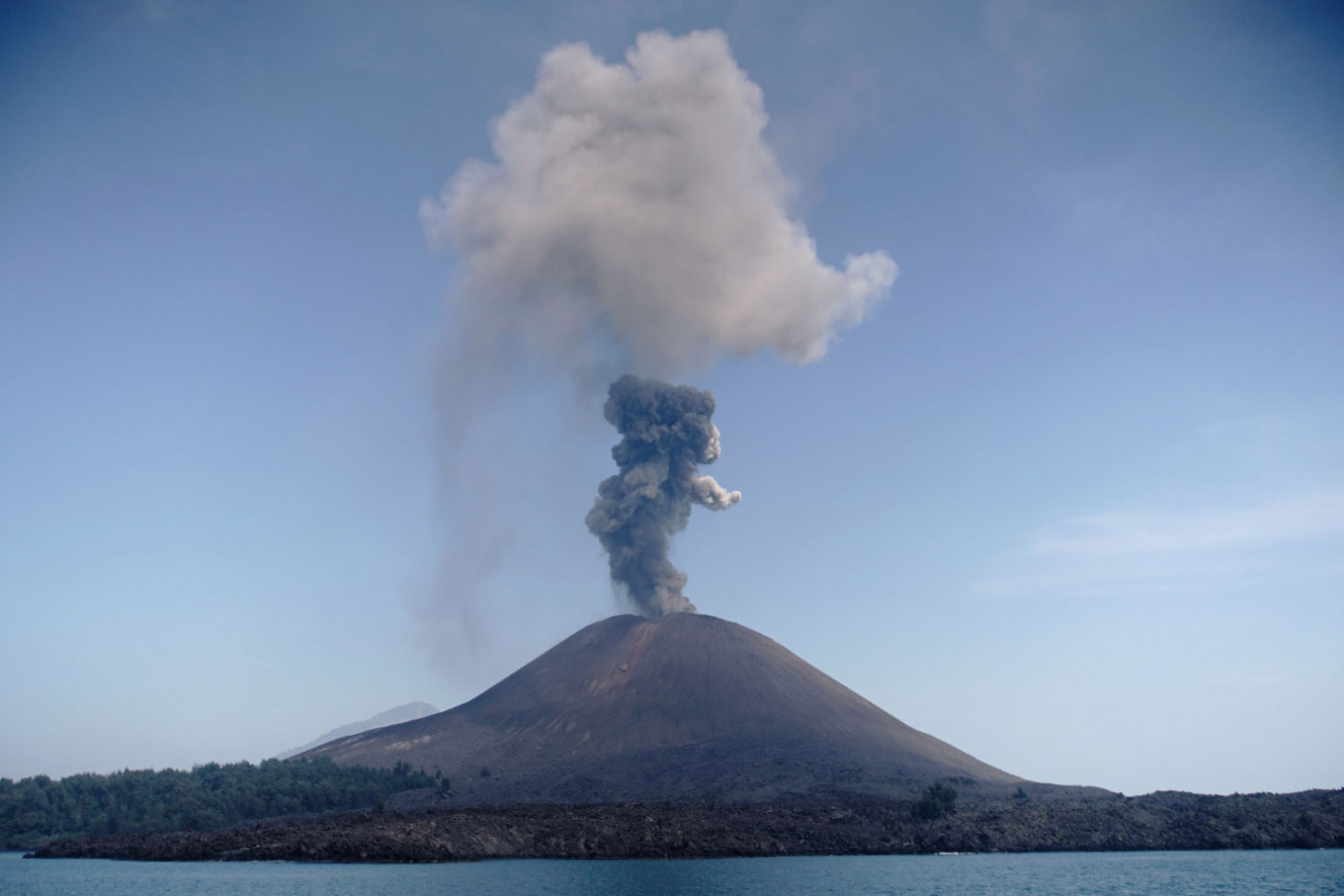Popular Reads
Top Results
Can't find what you're looking for?
View all search resultsPopular Reads
Top Results
Can't find what you're looking for?
View all search resultsAnak Krakatau erupts, loud rumble heard in virus-stricken Greater Jakarta
Some internet users in Greater Jakarta claimed to have heard eruptions coming all the way from Anak Krakatau (Child of Krakatau).
Change text size
Gift Premium Articles
to Anyone
Anak Krakatau (Child of Krakatau) volcano in Lampung erupted on Friday, spewing out a 200-meter-high column of ash and smoke.
The Center for Volcanology and Geological Disaster Mitigation’s (PVMBG) magma volcanic activity report said that the first eruption lasted one minute and 12 seconds starting at 9:58 p.m., when it spewed out ash and smoke 200 meters high.
The volcanology center reported a second eruption at 10:35 p.m. that lasted for 38 minutes and 4 seconds, spewing out a 500-meter-high column of ash that blew to the north.
“PVMBG monitoring shows that the eruption continued until Saturday morning at 5:44 WIB [Western Indonesian Time],” the head of the National Disaster Mitigation Agency’s (BNPB) data, information and communication center, Agus Wibowo, said in a statement on Saturday.
Erupsi Gunung Krakatau #Erupsi #GunungApi #Krakatau pic.twitter.com/1NMgx6SwSw
— BNPB Indonesia (@BNPB_Indonesia) April 10, 2020
Some internet users in Greater Jakarta said they had heard a loud rumble before reports of eruptions and assumed that they were hearing the sound of Anak Krakatau after being informed about the volcano. The authorities, however, doubted the assumption, saying the eruptions could not even be heard from the Anak Krakatau observation post.
“[The loud rumble] might be unrelated to the eruption,” PVMBG head Kasbani said.
People who live near the volcano in Banten and Lampung also wrote on Twitter that they did not hear anything.
Volcanology expert Surono, however, suggested that netizens in Greater Jakarta could be right.
The sound caused by the eruption could have echoed throughout Greater Jakarta as there was less activity and noise in the area as a result of large-scale social restrictions over COVID-19, he said.
Coincidentally, Friday marked the first day of a partial lockdown in the capital.
Anak Krakatau is erupting now. The first image is from our webcam:https://t.co/O8KFco7NOx
The second photo was taken from our observatory (~43 km from the volcano). pic.twitter.com/nlHHWIyuAw
— Dr. Devy Kamil Syahbana 🌋 (@volcanohawk) April 10, 2020
The South Lampung Disaster Mitigation Agency (BPBD) in Lampung reported no scent of sulfur or volcanic ash in the regency and alerted local residents that volcanic activity on Anak Krakatau had died down.
“The BPBD contacted the Anak Krakatau observation team. They said that the status was still at ‘alert’ and that the volcanic activity had stopped, so the residents were advised not to panic,” Agus said.
Military and police officers are on standby with village and subdistrict officials over the possible evacuation of residents.
Kasbani said the eruption was relatively small compared to eruptions that occurred between December 2018 and January 2019.
“[The eruption is] still within the expected level for a disaster-prone area. Continued eruptions could potentially occur, but there has been no detection of volcanic activity that could lead to greater eruption intensity,” Kasbani said
Rahmatullah, a resident of Sebesi Island, located 19 kilometers from the volcano, reported that thick ash started dropping on the island.
“The ash is thick and started dropping at 12 p.m. There is still ash present in front of my house,” Rahmat said as quoted by kompas.com, adding that residents living on the coastline evacuated after a warning from officials.
The last major eruption took place last December, when the mountain spewed out a 200-meter-high column of ash. A year earlier, an eruption triggered a landslide that led to a tsunami that killed at least 430 people.
Following Friday’s eruptions, residents of the Kalianda coastline in South Lampung also evacuated, fearing that a tsunami might occur again.
“They immediately fled to the mountains as they were still traumatized by the previous tsunami,” Umar, a South Lampung resident, told kompas.com.
Surono said another tsunami was less likely to occur as the 2018 tsunami was caused by a soil erosion buildup from years of eruption.
He said that Anak Krakatau eruptions were a common occurrence. “The mountain even erupted continuously throughout the year at one point, but residents are more concerned now due to the previous tsunami.”
In 1883, Krakatau volcano erupted in one of the biggest blasts in recorded history, killing more than 36,000 people in a series of tsunamis and lowering the global surface temperature by 1 degree Celsius with its ash. Anak Krakatau is the island that emerged from the area in 1927 and has been growing ever since.










